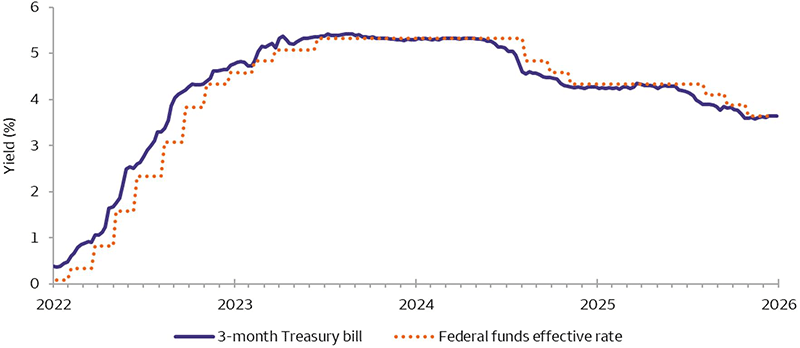February 24, 2026
Tony Miano, CFA, CAIA, Investment Strategy Analyst
Putting excess cash to better use
 Sources: Bloomberg and Wells Fargo Investment Institute. Data as of February 9, 2026. Money market fund yields are represented by the yield on a three-month Treasury bill. Yields represent past performance and fluctuate with market conditions. Current yields may be higher or lower than those quoted above. Past performance is no guarantee of future results. Excerpted from Investment Strategy report (February 23)
Sources: Bloomberg and Wells Fargo Investment Institute. Data as of February 9, 2026. Money market fund yields are represented by the yield on a three-month Treasury bill. Yields represent past performance and fluctuate with market conditions. Current yields may be higher or lower than those quoted above. Past performance is no guarantee of future results. Excerpted from Investment Strategy report (February 23)Why investors keeping excess cash in money market funds may want to consider reallocating
Cash can play an important role in any financial plan. It provides liquidity for emergencies and short-term expenses, and it may serve as “dry powder” for investment opportunities. However, many investors today keep extra cash beyond liquidity needs in money market funds given their short maturity and attractive yields.
The chart above demonstrates the risk of keeping excess cash in ultra-short-term maturities. Money market funds have historically been tightly correlated with the federal funds rate, and we anticipate that the Federal Reserve (Fed) will continue to cut rates in 2026, with yields falling in sync. As money market funds offer little ability to lock in yields at current levels, we believe investors should examine these allocations as well as other cash-alternative holdings.
What it may mean for investors
We believe the role of cash alternatives in a portfolio should primarily be in service of liquidity needs. In our view, investors with excess cash in these instruments may want to consider locking in today’s rates with intermediate-term bonds (in the three- to seven-year range) and a little more credit risk. We are therefore favorable on both U.S Intermediate Term Taxable Fixed Income and U.S. Taxable Investment Grade Fixed Income.
Risk Considerations
Each asset class has its own risk and return characteristics. The level of risk associated with a particular investment or asset class generally correlates with the level of return the investment or asset class might achieve. Bonds are subject to market, interest rate, price, credit/default, liquidity, inflation, and other risks. Prices tend to be inversely affected by changes in interest rates. Cash alternatives typically offer lower rates of return than longer-term equity or fixed-income securities and provide a level of liquidity and price stability generally not available to these investments. Some examples of cash alternatives include: bank certificates of deposit; bank money market accounts; bankers’ acceptances, federal agency short-term securities, money market mutual funds, Treasury bills, ultra-short bond mutual funds or exchange-traded funds, and variable rate demand notes. Each type of cash alternative has advantages and disadvantages which should be discussed with your financial advisor before investing.
General Disclosures
Global Investment Strategy (GIS) is a division of Wells Fargo Investment Institute, Inc. (WFII). WFII is a registered investment adviser and wholly owned subsidiary of Wells Fargo Bank, N.A., a bank affiliate of Wells Fargo & Company.
The information in this report was prepared by Global Investment Strategy. Opinions represent GIS’ opinion as of the date of this report and are for general information purposes only and are not intended to predict or guarantee the future performance of any individual security, market sector or the markets generally. GIS does not undertake to advise you of any change in its opinions or the information contained in this report. Wells Fargo & Company affiliates may issue reports or have opinions that are inconsistent with, and reach different conclusions from, this report.
The information contained herein constitutes general information and is not directed to, designed for, or individually tailored to, any particular investor or potential investor. This report is not intended to be a client-specific suitability or best interest analysis or recommendation, an offer to participate in any investment, or a recommendation to buy, hold or sell securities. Do not use this report as the sole basis for investment decisions. Do not select an asset class or investment product based on performance alone. Consider all relevant information, including your existing portfolio, investment objectives, risk tolerance, liquidity needs and investment time horizon. The material contained herein has been prepared from sources and data we believe to be reliable but we make no guarantee to its accuracy or completeness.
Wells Fargo Advisors is registered with the U.S. Securities and Exchange Commission and the Financial Industry Regulatory Authority, but is not licensed or registered with any financial services regulatory authority outside of the U.S. Non-U.S. residents who maintain U.S.-based financial services account(s) with Wells Fargo Advisors may not be afforded certain protections conferred by legislation and regulations in their country of residence in respect of any investments, investment transactions or communications made with Wells Fargo Advisors.
Wells Fargo Advisors is a trade name used by Wells Fargo Clearing Services, LLC and Wells Fargo Advisors Financial Network, LLC, Members SIPC, separate registered broker-dealers and non-bank affiliates of Wells Fargo & Company.


